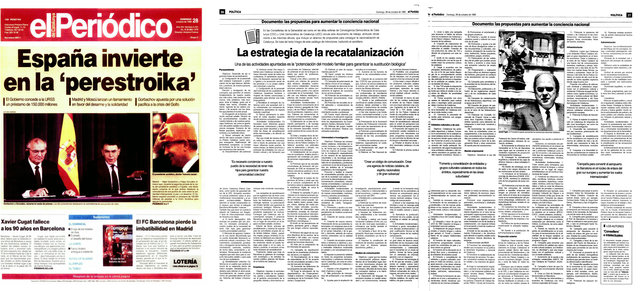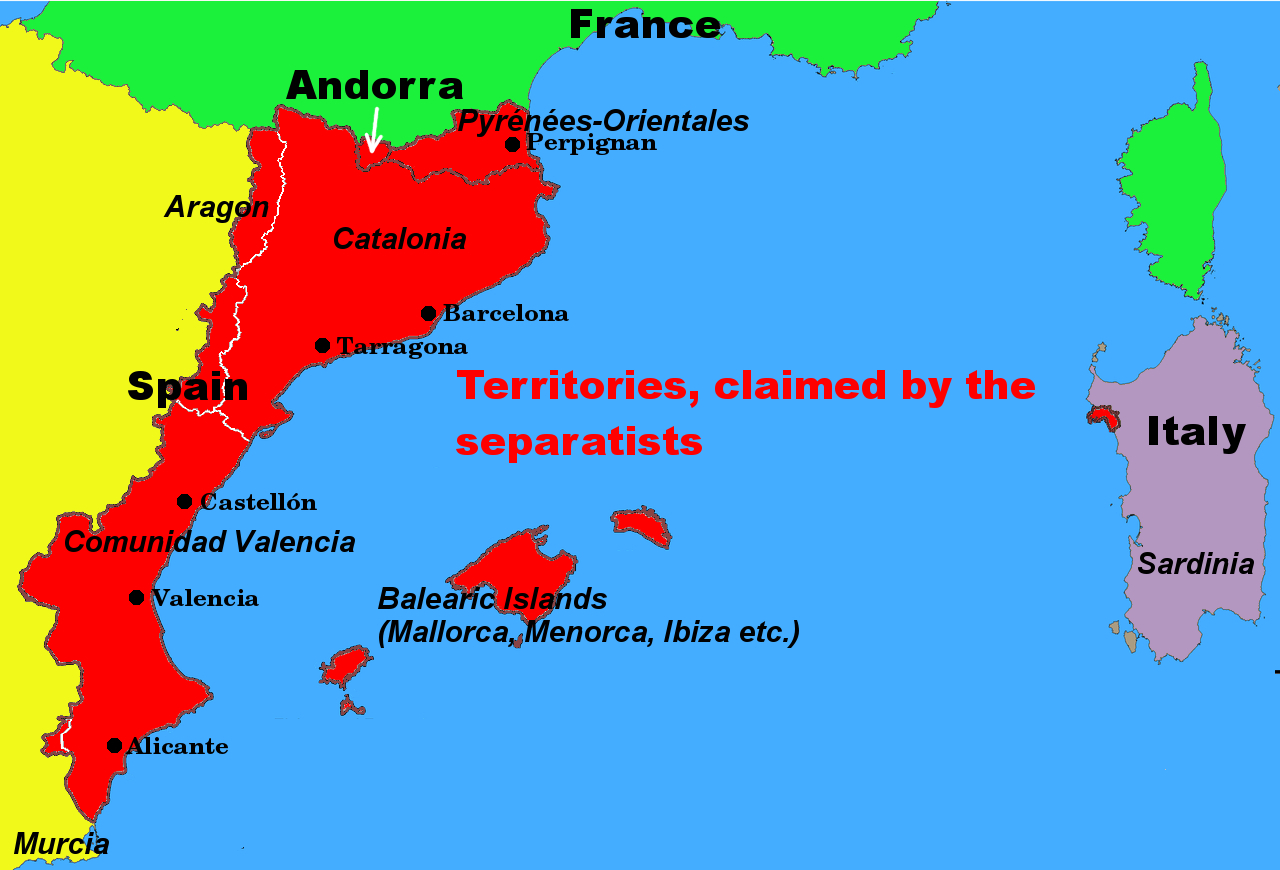Orihuela (province of Alicante): 77,000 inhabitants, 20,000 on the road
Thousands demonstrate for the free choice of language!
January 20, 2020
The parents' association FAPA Gabriel Miró had called for a protest against the „Ley del Plurilingüismo“ (Multilingualism Law), because this law does not promote multilingualism, but aims to oust Spanish from the classroom. In the province of Alicante, as part of the Comunidad Valenciana, the overwhelming majority speaks only Spanish and no Valenciano at all, no wonder that the protest is initially most fierce here. It's as if in London lessons have to be taught in Liverpool-English (Scouse!).
The main demonstration took place on Saturday in Orihuela, some of the demonstrators arrived by bus and filled the streets the biggest crowd the place had ever seen. In 12 other cities of the Comunidad Valencia there were rallies of support, as shown here in the picture from Valencia with the demands: „Freedom of choice of language“, „Stop the dictatorship of language“, „Let the families decide and not the politicians“, „Spain without linguistic obstacles“.
Spain's absurd and confusing language situation
These demonstrations and rallies were partly supported by the conservative parties PP[1] and Cs[2] as well as by the ultra-right VOX. For some this was a reason to call these demonstrations right-wing, ultra-right-wing or even fascist.
The Ley del Plurilingüismo, called the Fraud Language Law by parents, has been pushed through by the Valencian PSOE with the help of its far-right coalition partner (Bloque Nacionalista Valenciano) and Compromís (Greens) in the Valencian parliament. This counter-democratic law is also a demand of the parliamentary left-wing parties.
We must ask, however, why then in Galicia, where the PP is in government, the same language dictatorship prevails. Contrary to the Constitution, the provincial government here communicates monolingually in Galician and is displacing the Spanish language. The PP's policy here is very similar to that of the PSOE.
Accordingly, the election programmes of the PP and Cs did not include any demand for freedom of choice of language. Instead, it is discussed, to varying degrees, of how much Valenciano and Spanish should be organised in the teaching of the Comunidad Valenciana. So we have a situation where the freedom of choice cannot be found, because freedom of choice could also mean 100% Spanish or 100% Valenciano. The demands of these parties are not really helpful in the effort to give parents the freedom to choose the language of instruction for their children but rather intended to distract from this goal.
The PSOE[3] appears in the autonomous regions more or less hidden separatist or with sympathies for separatism. In contrast to the national PSOE. In this context, the regional socialists partly support the language dictatorship with a bizarre choice of words, in which they speak of „promoting“ regional languages.
The separatists themselves use the language problem, especially in schools, to indoctrinate students towards their ideologies. For example, the Valencian government wants to persuade pupils that their mother tongue is Valenciano, even though the majority are Spanish-speaking[4] In Catalonia the government has long since established a language dictatorship similar to that of the Franco era, only the other way round. Now it's not Catalan that is being pushed to the margins, but Spanish.
Is nationalism left or right?
Nationalism as an idea came up with the French revolution and was directed against feudalism. The unifying bond was more or less a common culture, a common language. In this respect, nationalism can certainly be regarded as a leftist idea.Footnotes
The negative side of exaggerated nationalism can be seen at the beginning of the First World War, when people no longer killed eachother in the name of their emperor, God and fatherland, but in the name of a nation, a state. Only left-wing minorities in all states had spoken out against this bellicose nationalism at that time.
The states in Western Europe are not necessarily uniform with the nations, cultures and language communities. In Germany, for example, we have Danish and Sorbian minorities, in Spain we find Catalans, Galicians, etc. Great Britain have the English Scots, Irish and Welsh. In Eastern Europe the mixture is sometimes even more colourful, as you can see in Romania or Hungary.
Today the European states (with the exception of Russia) have long since ceased to play a decisive role in the world. The world has been dominated by the USA since World War II and China is increasingly contesting this role. We will probably soon have to talk about a bipolar, perhaps even multipolar world, in which hopefully a world war will not return.
Nationalism in Europe, understood as left or right, only plays a role in this respect as state borders have a necessary, albeit limited, effect in making laws. Security, environmental protection, occupational health and safety, border protection etc. are just examples and are supplemented by the remark that we need protection against the global, now above all, digital corporations, which do not pay taxes like we do, mostly almost no taxes at all.[5]
In this situation in Europe, those who demand the primacy of politics should be separate nations and/or ethnic groups from the existing states are accused of serving only those who live by dividing the people and distracting them from important problems. Divide et impera.
From this point of view I refuse to label Spanish nationalism or regional separatism with left or right. Everyone should ask themselves how helpful these two categories are in assessing these conflicts.
I know that language dictatorship only serves an exaggerated nationalism. To be against it is democratic.
[1] PP = Partido Popular = Conservatives
[2] Cs = Ciudadanos = Liberals
[3] PSOE = Partido Socialista Obrero Español = Labour
[4] La asociación ‘Hablamos Español’ denuncia que la Generalitat trata de sustituir el español por el valenciano
https://confilegal.com/20181210-hablamos-espanol-no-queremos-que-a-nuestros-hijos-les-digan-que-el-espanol-no-es-su-lengua/
[5] https://www.pcwelt.de/a/analyse-amazon-zahlt-auch-2018-fast-keine-steuern,3464094
| | | | Click here to subscribe or cancel your subscription |
Myths and deceptions of Catalan nationalism

Here you'll find the translation
The strategy of recatalanization
 1980 the Spanish journal "El Periodico" published a secret document about the strategy of the Catalan government. It shows in a frightening way the actual spiritual world of the separatist leaders.
1980 the Spanish journal "El Periodico" published a secret document about the strategy of the Catalan government. It shows in a frightening way the actual spiritual world of the separatist leaders.Now it is available in english translation.
Pancatalanism
the separatist's imperial claim
 The Catalan government exports the conflict into communities with Catalan population, supporting all efforts of the separatists including financial means to destroy Spain.
The Catalan government exports the conflict into communities with Catalan population, supporting all efforts of the separatists including financial means to destroy Spain. An important tool is the establishment of a language dictatorship that is not afraid to use the same means as Franco.
Separatist indoctrination

Click here to read the study
Language imposition and democracy

An essay in 6 parts on the potentially violent effect of language imposition containing contributions from South Africa, Catalonia, Ukraine and France.
go to part 1
Publications
 The title says: "Catalonia, a conflict is exported. Insights of a migrant"
The title says: "Catalonia, a conflict is exported. Insights of a migrant"Sorry, up to now, this book is only available in German. However, drop us a line, if you are interested to learn more Contact.
